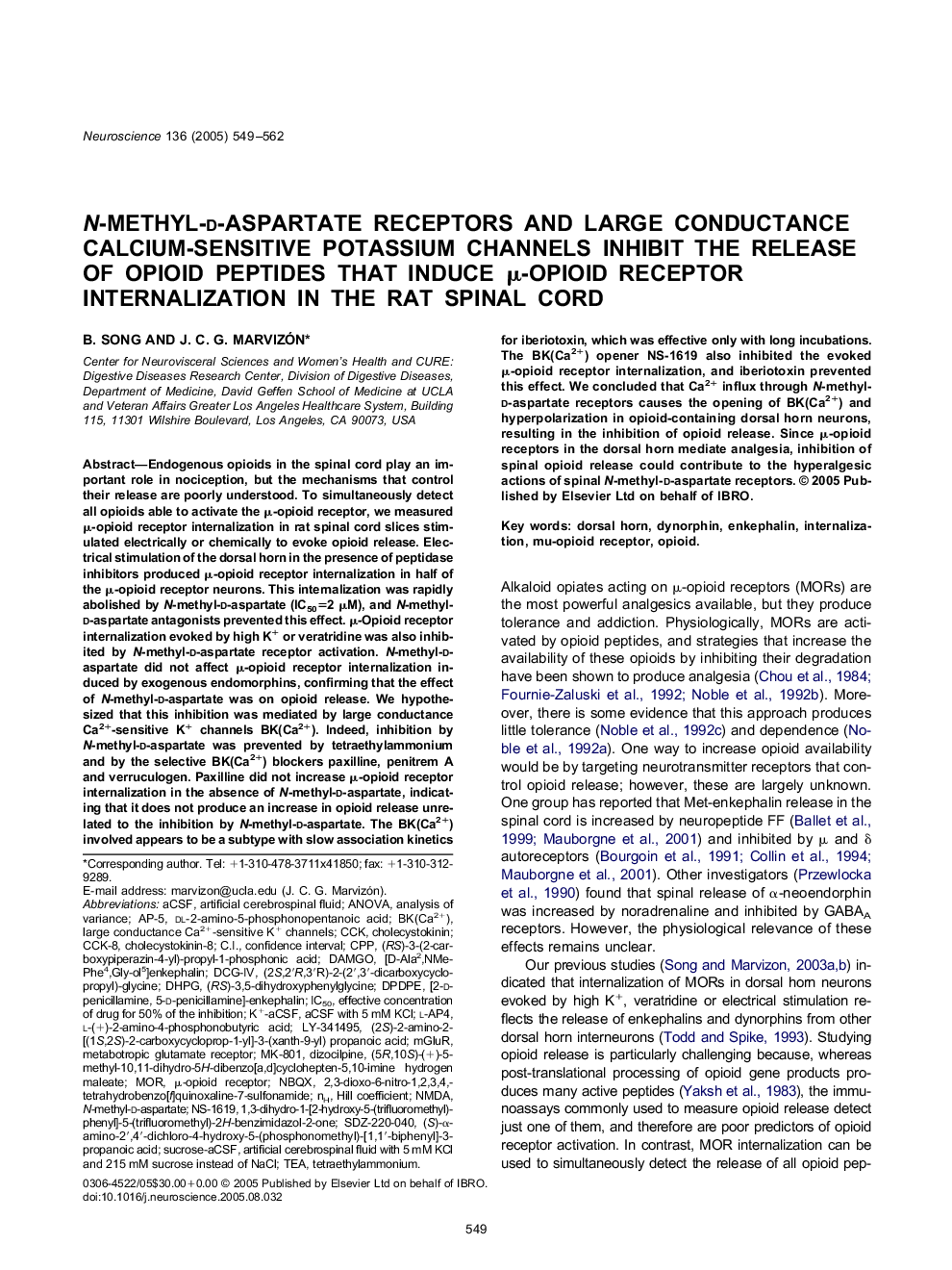| Article ID | Journal | Published Year | Pages | File Type |
|---|---|---|---|---|
| 9425396 | Neuroscience | 2005 | 14 Pages |
Abstract
Endogenous opioids in the spinal cord play an important role in nociception, but the mechanisms that control their release are poorly understood. To simultaneously detect all opioids able to activate the μ-opioid receptor, we measured μ-opioid receptor internalization in rat spinal cord slices stimulated electrically or chemically to evoke opioid release. Electrical stimulation of the dorsal horn in the presence of peptidase inhibitors produced μ-opioid receptor internalization in half of the μ-opioid receptor neurons. This internalization was rapidly abolished by N-methyl-d-aspartate (IC50=2μM), and N-methyl-d-aspartate antagonists prevented this effect. μ-Opioid receptor internalization evoked by high K+ or veratridine was also inhibited by N-methyl-d-aspartate receptor activation. N-methyl-d-aspartate did not affect μ-opioid receptor internalization induced by exogenous endomorphins, confirming that the effect of N-methyl-d-aspartate was on opioid release. We hypothesized that this inhibition was mediated by large conductance Ca2+-sensitive K+ channels BK(Ca2+). Indeed, inhibition by N-methyl-d-aspartate was prevented by tetraethylammonium and by the selective BK(Ca2+) blockers paxilline, penitrem A and verruculogen. Paxilline did not increase μ-opioid receptor internalization in the absence of N-methyl-d-aspartate, indicating that it does not produce an increase in opioid release unrelated to the inhibition by N-methyl-d-aspartate. The BK(Ca2+) involved appears to be a subtype with slow association kinetics for iberiotoxin, which was effective only with long incubations. The BK(Ca2+) opener NS-1619 also inhibited the evoked μ-opioid receptor internalization, and iberiotoxin prevented this effect. We concluded that Ca2+ influx through N-methyl-d-aspartate receptors causes the opening of BK(Ca2+) and hyperpolarization in opioid-containing dorsal horn neurons, resulting in the inhibition of opioid release. Since μ-opioid receptors in the dorsal horn mediate analgesia, inhibition of spinal opioid release could contribute to the hyperalgesic actions of spinal N-methyl-d-aspartate receptors.
Keywords
mGluR(RS)-3,5-dihydroxyphenylglycineDCG-IVMK-801Cholecystokinin-8N-methyl-d-aspartateNMDADHPGAP-5CCKaCSF(2S)-2-amino-2-[(1S,2S)-2-carboxycycloprop-1-yl]-3-(xanth-9-yl) propanoic acidl-AP4DPDPECCK-8C.I.CPPMORNBQXIC50DAMGOl-(+)-2-amino-4-phosphonobutyric acidOpioidμ-Opioid receptorDL-2-Amino-5-phosphonopentanoic acidenkephalinTetraethylammoniumanalysis of varianceANOVAInternalizationdynorphindorsal hornHill coefficientconfidence intervalartificial cerebrospinal fluidTEAcholecystokininMetabotropic glutamate receptormu-opioid receptor
Related Topics
Life Sciences
Neuroscience
Neuroscience (General)
Authors
B. Song, J.C.G. Marvizón,
